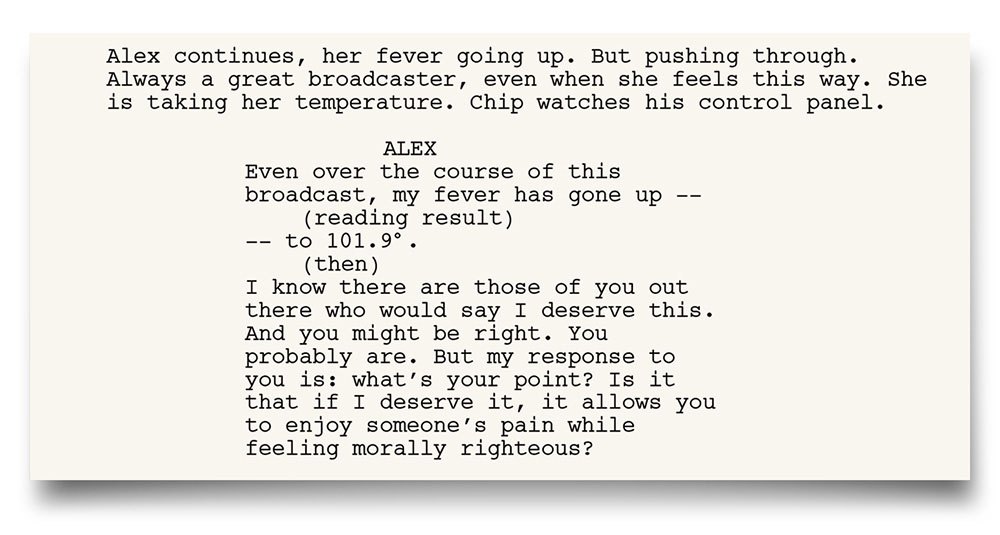
COURTESY OF APPLE TV+

“The whole season was very much about the disparity between how we present ourselves, in this age of social media, and who we really are,” says The Morning Show showrunner Kerry Ehrin. “Sometimes the presentation becomes more important than who we really are.” That theme comes to a head with the final moments of the Apple TV+ series’ second season, which sees Alex Levy (Jennifer Aniston) battling COVID and delivering an emotional monologue to TMS viewers after a tell-all book reveals the truth of her off-camera relationship with co-anchor Mitch Kessler (Steve Carell).
Ehrin recalls being exhausted on the verge of completing season two. “We were right at the end of production — and the end of a COVID production, which was a whole other thing,” she says. “I was looking at a blank page and thinking, ‘OK, I need to sum up this woman’s stage of being that has a landing place but feels real. I didn’t want it to feel like she was making a big speech with a lot of bravado.”

COURTESY OF APPLE TV+
“[Alex is] a very broken-down person trying to find some truth,” says Ehrin. “In a lot of ways, she is talking to herself.”

COURTESY OF APPLE TV+
Ehrin says her characters are often “a release” for her own emotions and ideas, and she wanted to tackle COVID-19 on the show from a human point of view. “I wanted the scene to have a very compact feeling and a humbleness to it, a humility against what was going on in the world,” she says. “I didn’t want fireworks or some fake big drama, high stakes. I wanted it to feel human.”

COURTESY OF APPLE TV+
After two seasons of writing for “the genius” Aniston, Ehrin admits she hears her voice in her head as she’s writing for Alex. “You really kind of start to channel your actors,” she says. “When you have the great fortune to write for someone who has such a very specific voice, it’s a great joy. It’s like a conjoining of yourselves. That’s very gratifying.”

COURTESY OF APPLE TV+
Alex is “fed up with public scrutiny [and doesn’t] give a fuck anymore,” says Ehrin. “Now she’s saying, ‘I’m going to just steer my life from my instincts and my heart, and I’m going to make that person the best person they can be. If that’s not good enough for you, so be it, but that’s who I am.’ “

COURTESY OF APPLE TV+
This story first appeared in a June stand-alone issue of The Hollywood Reporter magazine. To receive the magazine, click here to subscribe.